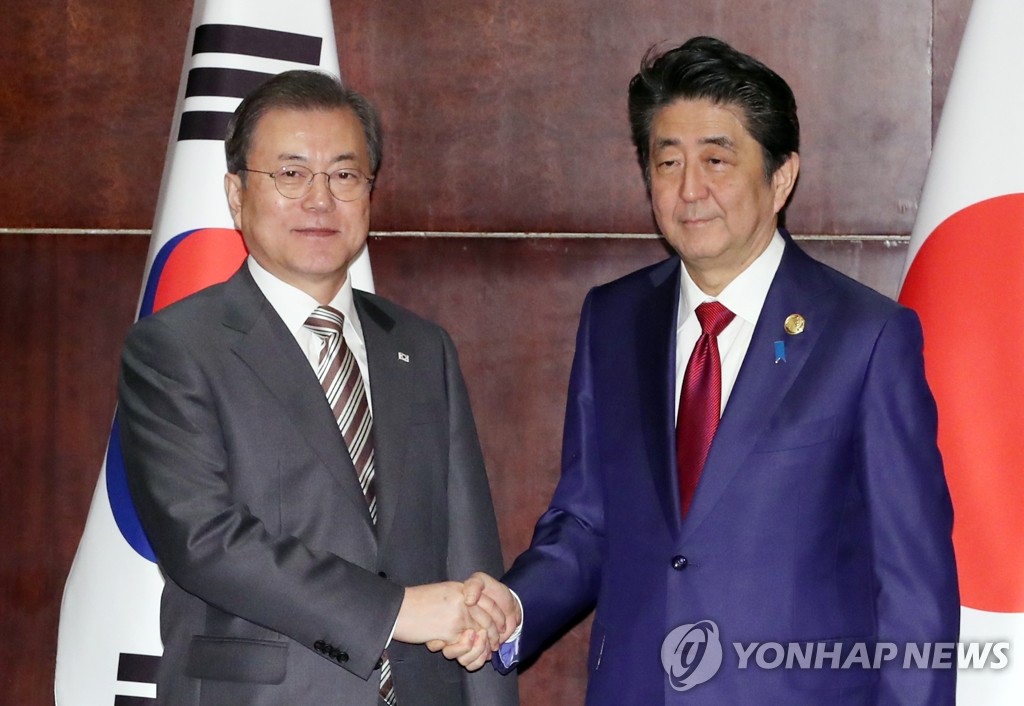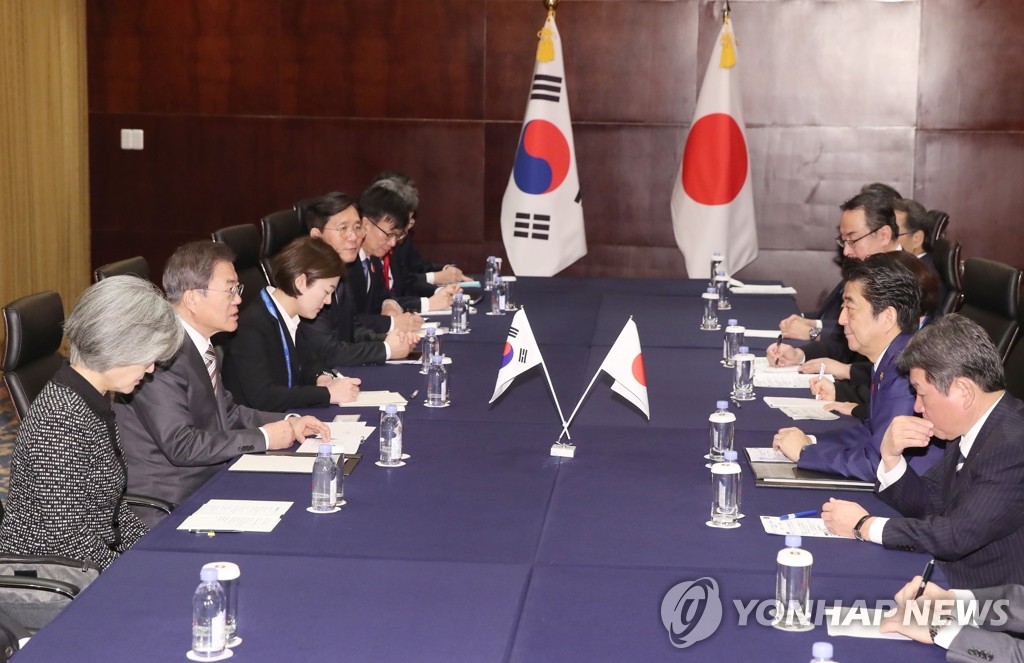- California Assembly OKs highest minimum wage in nation
- S. Korea unveils first graphic cigarette warnings
- US joins with South Korea, Japan in bid to deter North Korea
- LPGA golfer Chun In-gee finally back in action
- S. Korea won’t be top seed in final World Cup qualification round
- US men’s soccer misses 2nd straight Olympics
- US back on track in qualifying with 4-0 win over Guatemala
- High-intensity workout injuries spawn cottage industry
- CDC expands range of Zika mosquitoes into parts of Northeast
- Who knew? ‘The Walking Dead’ is helping families connect
Moon urges Abe to completely retract export restrictions against Seoul
South Korean President Moon Jae-in called on Japanese Prime Minister Shinzo Abe to withdraw all of Tokyo’s export curbs against Seoul during their first summit talks in 15 months, according to Cheong Wa Dae.
In connection with the trade issue, Moon stressed that Japan should return to the situation before July 1, when Tokyo toughened its export control of three kinds of major industrial materials in apparent reprisal for the Moon administration’s stance on the issue of wartime forced labor compensation.
Moon suggested speedy working-level consultations on the trade matter.
On the problem of how to compensate Korean victims of World War II forced labor, the leaders confirmed their differences but agreed on the need to resolve the matter through dialogue, Cheong Wa Dae spokesperson Ko Min-jung told reporters.


South Korean President Moon Jae-in (L) shakes hands with Japanese Prime Minister Shinzo Abe in Chengdu, China, on Dec. 24, 2019. (Yonhap)
Moon expressed hope that the summit will be a chance to raise expectations of both countries for a resolution to pending issues through dialogue.
They also exchanged views on recent “grave” security conditions on the Korean Peninsula. Abe requested support for his government’s efforts to resolve the issue of Japanese nationals kidnapped by North Korea decades ago, and Moon agreed to continue support for Japan’s related efforts, Ko said.
They had been scheduled to meet for half an hour, but the summit lasted for about 50 minutes.
Beginning the talks at a hotel in this southwestern Chinese city of Chengdu, Moon told Abe that it is important to have “frank dialogue” for a change in Seoul-Tokyo relations.
He stressed that South Korea and Japan are the closest neighbors “geographically, historically and culturally,” speaking in front of pool reporters.
Although the relationship has been “uncomfortable” for a brief time, the two sides can never be apart, he added.
Abe agreed that the two sides are important neighbors and that trilateral security cooperation with the United States is especially crucial.
He added that he wants to improve Japan’s relationship with South Korea.
They had the summit in the wake of an annual group summit with Chinese Premier Li Keqiang in the mainland Chinese city.
Earlier in the day, South Korean Foreign Minister Kang Kyung-wha had preparatory talks with her Japanese counterpart, Toshimitsu Motegi, in Chengdu.
Last week, Japan relaxed some of its export restrictions, but South Korea said the measures are not sufficient for a fundamental resolution to the problem. The Moon administration earlier suspended its move to terminate an accord with Japan on exchanging military information.
Moon took note of Japan’s latest “voluntary” step, describing it as “some progress” and a goodwill gesture for a dialogue-based resolution to the export control problem, a Cheong Wa Dae official said later on background.
South Korea’s Supreme Court ordered two Japanese firms to pay compensation for the victims. Japan, however, argued that all reparations associated with its 1910-45 colonial rule of Korea were already settled in a 1965 state-to-state deal on normalizing bilateral diplomatic relations.
The court said forced labor victims still have their individual rights to compensation, and the Moon administration stated that it respects the court ruling under the democratic system of separation of powers.
It marked the sixth round of formal summit talks between Moon and Abe.
The previous Moon-Abe formal summit took place in New York in September last year on the sidelines of a U.N. General Assembly session.
Moon was set to return home on Tuesday night, wrapping up his two-day trip to China.
On Monday, he had a separate summit with Chinese President Xi Jinping in Beijing. They stressed the need to maintain the momentum of nuclear talks with North Korea despite its renewed saber-rattling.











